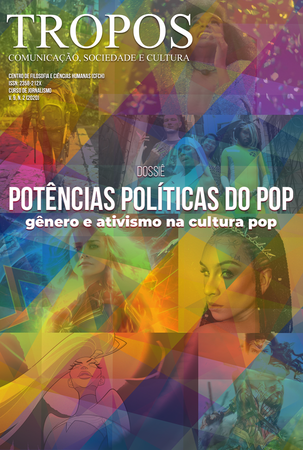PARECE QUE O JOGO VIROU – DISCURSOS ACERCA DE IDENTIDADES LGBTQ EM COMUNIDADES DE JOGADORES DA ACTIVISION-BLIZZARD
Palavras-chave:
Sexualidade, Jogos Digitais, Arqueologia, RepresentatividadeResumo
O presente artigo tem como objetivo fazer uma análise comparativa dos discursos de jogadores(as) sobre representação de identidades LGBTQs em discussões de blogs e sites especializados na cobertura de jogos da produtora Activision-Blizzard, em dois momentos distintos entre 2006 e 2019. Usando como metodologia a análise de enunciados inspirada na arqueologia focaultiana, concluímos que as políticas de representatividade LGBTQ adotadas pela Activision-Blizzard no Pós-Gamergate promoveram um deslocamento discursivo das estratégias de enfrentamento direto, articuladas pelas comunidades LGBTQ dentro destes espaços, para a apropriação de enunciados de silenciamento de debate que antes eram usadas contra esses mesmos grupos.
Referências
ALEXANDER, Jonathan, MCCOY, Mack e VELEZ, Carlos. “A Real Effect on Gameplay”: Computer Gaming, Sexuality and Literacy. In Selfe, Cinthia L., Hawisher, Gail E. (Orgs.). Gaming Lives in The Twenty-First Century. Nova York: Palgrave Macmillan, 2007, pp. 167 – 190.
BLANCO, Beatriz. Games para mulheres: do Girls Game Movement ao pós Gamergate. In: INTERCOM, 40º Congresso Brasileiro de Ciências da Comunicação, 2017, Curitiba. Anais eletrônicos... Curitiba. Disponível em: < http://portalintercom.org.br/anais/nacional2017/resumos/R12-0280-1.pdf >. Acesso em: 21 jun. 2020.
Blizzwatch. Overwatch will be diverse, include gay characters. 2015. Disponível em: <https://blizzardwatch.com/2015/11/07/overwatch-will-diverse-include-gay-characters/>
Blizzwatch. BlizzCon 2018 had an Inclusion Nexus to shine a spotlight on military, women, and LGBTQ community. 2018. Disponível em: <https://blizzardwatch.com/2018/11/29/blizzcon-2018-inclusion-nexus-shine-spotlight-military-women-lgbtq-community/>
BUTLER, Judith; BUTLER, KIRT CHARLES. Excitable speech: A politics of the performative. Psychology Press, 1997.
CASSEL, Justine. e JENKINS, Henry; From Barbie to Mortal Kombat: Gender and Computer Games, MIT Press, Cambridge, 1998
ERIBON, Didier. Reflexões Sobre a Questão Gay. Companhia de Freud, Rio de Janeiro, 2008.
FOUCAULT, Michel. A Ordem do Discurso. Rio de Janeiro, Editora Graal, 2008.
FOUCAULT, Michel. A Arqueologia do Saber. Rio de Janeiro, Forense Universitária, 2004.
FOUCAULT, Michel. A História da Sexualidade. Rio de Janeiro, Editora Graal, 1986
GOULART, Lucas Aguiar; HENNIGEN, Inês Inês; NARDI, Henrique Caetano. “We’re gay, we play, we’re here to stay”: notas sobre uma parada de orgulho LGBTQ no jogo World of Warcraft//“We’re gay, we play, we’re here to stay”: notes about a LGBTQ pride parade in World of Warcraft. Contemporânea, v. 13, n. 2, p. 401-416, 2015.
GOULART, Lucas Aguiar; NARDI, Henrique Caetano. O Circuito da Diversão ou Da Ludologia à Ideologia: Diversão, Escapismo e Exclusão na Cultura de Jogo Digital. Logos, v. 26, n. 2, p. 72-85, 2019.
HALPERIN, David M.; TRAUB, Valerie (Ed.). Gay shame. University of Chicago Press, 2009.
JACKSON, Stevi, SCOTT, Sue. The Personal is Still Political: Heterossexuality, Feminism and Monogamy. Feminism & Psychology. Londres, Thousand Oaks e Nova Dhéli. vol 14, no. 1,, 2004, pp. 151-157
JOANILHO, André Luiz; JOANILHO, Mariângela P. Galli. Enunciado e sentido em Michel Foucault. Revista Línguas, v. 27, p. 27-41, 2011
NARVAZ, Martha; NARDI, Henrique Caetano; MORALES Blanca. Nas tramas do discurso: A abordagem discursiva de Michel Pêcheux e de Michel Foucault.. Revista Psicologia Política, v. 6. 2007
O’RIORDAN, Kate. Queer Theories and Cybersubjects: Intersecting Figures. In O’Riordan, K. e Phillips, D.J. Queer Online. Peter Lung Publishing, Nova York, 2007.
PHILLIPS, Amanda. Welcome to My Fantasy Zone: Bayonetta and Queer Femme Disturbance. In: Rubergh, Bonnie, Shaw, Adrienne. Queer Game Studies. University of Minnesota Press, 2017
POZO, Teddy. “Queer Games After Empathy: Feminism and Haptic Game Design Aesthetics from Consent to Cuteness to the Radically Soft”, Game Studies, vol. 18, ed. 3, Dez. 2018. Disponível em: <http://gamestudies.org/1803/articles/pozo>.
POZO, Diana; RUBERG, Bonnie; GOETZ, Chris. In Practice: Queerness and Games. Camera Obscura: Feminism, Culture, and Media Studies, v. 32, n. 2 (95), p. 153-163, 2017.
PUAR, Jasbir K. Terrorist assemblages: Homonationalism in queer times. Duke University Press, 2018.
ROBARDS, Brady Jay et al. Twenty years of ‘cyberqueer’: The enduring significance of the Internet for young LGBTIQ+ people. In: Youth, sexuality and sexual citizenship. Routledge, 2018. p. 151-167.
RUBERG, Bonnie. Video games have always been queer. NYU Press, 2019.
RUBIN, Gayle. Thinking Sex: Notes for a Radical Theory of the Politics of Sexuality. In Abelove, H., Barale, M.A., Halperin, D.M., The Lesbian and Gay Studies Reader, Routledge, Nova York, 1993.
SHAW, Adrienne. Gaming at The Edge: Sexuality and Gender at the Margins of Videogame Culture. Minneapolis: University of Minnesota Press, 2014.
SHAW, Adrienne. Putting the Gay in Games Cultural Production and GLBT Content in Video Games. Games and Culture v. 4 n. 3, 228-253, 2009.
SHAW, Adrienne. Do you identify as a gamer? Gender, race, sexuality, and gamer identity. new media & society, v. 14, n. 1, p. 28-44, 2012.
WAKEFORD, Nina. Cyberqueer. In Munt, S.R., Medhurst, A. The Lesbian and Gay Studies Reader: A Critical Introduction. Cassel, Londres, 1998, pp. 20-38.
WEEKS, Jeffrey. O Corpo e a Sexualidade. In: LOURO, Guacira Lopes (Org.). O corpo educado: pedagogias da sexualidade. Belo Horizonte, Autentica, 1999, pp. 151-172
WILLIAMS, Dmitri, CONSALVO, Mia, YEE, Nick, CAPLAN, Scott. Looking for gender: Gender roles and behaviors among online gamers. Journal of communication, v. 59, n. 4, p. 700-725, 2009.
Downloads
Publicado
Como Citar
Edição
Seção
Licença
Transferência de direitos autorais:
Declaro que após aprovado para publicação a Revista Tropos editada pela Universidade Federal do Acre (UFAC), passará a ter os direitos autorais do trabalho, que se tornarão propriedade exclusiva da Revista, sendo permitida a reprodução total ou parcial desde que devidamente referenciada.

